
Casting Lines for Future Tournaments
August 12, 2016
By Jack Roberts
MHSAA Executive Director
The MHSAA is best known to the public for the tournaments it conducts to conclude the fall, winter and spring seasons each school year.
These tournaments, the first and largest program of the MHSAA, have survived the Vietnam War, the Korean conflict and two World Wars. They have survived the technology bubble, the housing collapse, the energy crisis and the Great Depression.
MHSAA tournaments existed at the dawn of aviation and at the time of our nation’s lunar landing. Popes, presidents and governors have changed and changed again and again, and MHSAA tournaments roll on year after year.
But the sense of tradition and permanence and inevitability of MHSAA tournaments doesn’t dissuade us from asking questions about our tournaments, even some of the most basic questions. Here are two.
Question #1
I have long been and will always be an advocate for a Ryder Cup format for the MHSAA Golf Finals, and a team tennis approach to the MHSAA Tennis Finals; but 90 years of tradition is hard to overcome. Might this be a more exciting format? Could it be co-ed? Could it reverse the decline in boys tennis participation, and increase girls golf participation? Wouldn’t it be fun to try?
Periodically, the International Olympic Committee requires each of the designated Olympic sports to defend its status, to state its case why the sport should remain a part of the Olympic program. Then, after a series or votes that retain one sport at a time, the IOC drops the sport that makes the weakest case. It does so to make room for one of the previously unlisted sports that makes the best case for inclusion.
This would appear to keep the existing Olympic sports on their toes, and to keep the Olympic movement fresh and reflective of modern trends in sports.
While I would not enjoy the controversy, I can see the potential for some positive results if the MHSAA were to invoke the same policy for determining the 14 tournaments it will provide for girls and the 14 for boys.
This might cause us to consider more deeply what a high school sport should look like, or at least what an MHSAA tournament sport should stand for.
On the one hand, we might be inclined to drop tournaments for those sports that involve mostly non-faculty coaches and non-school venues, or require cooperative programs to generate enough participants to support a team, or resort almost entirely to non-school funding, or cater to individuals more than teams.
Or perhaps this process would cause policymakers to forget traditional thinking and ask: “In this day and age, should we shake off traditional notions of sport and consider more where modern kids are coming from?” That might mean fewer team sports and more individual sports, more “extreme” sports like snowboarding and skateboarding, and more lifetime sports, meaning not just golf and tennis and running sports, but also fishing and even shooting sports.
Currently, MHSAA policy states that the MHSAA will consider sponsorship of a tournament series for any sport which 64 member schools conduct on an interscholastic basis as a result of action by the governing boards of those schools.
Should the only question be how many schools sponsor a sport, or must an activity also have certain qualities and/or avoid certain “defects?” What should an MHSAA tournament sport look like and stand for?
Question #2
Bristling from criticism that his association is a money-grabbing exploiter of children, my counterpart in another state said, “If we were running our programs just to make money, we would do very many things very differently.” I knew exactly what he meant.
Because we care about the health and welfare of students, because we mean what we say that the athletic program needs to maximize the ways it enhances the school experience while minimizing academic conflicts, and because we try to model our claim that no sport is a minor sport when it comes to its potential to teach young people life lessons, we operate our programs in ways that make promoters, marketers and business entrepreneurs laugh, cry or cringe.
If money were the only object, we would seed and select sites to assure the teams that attracted the most spectators had the best chance to advance in our tournaments, regardless of the travel for any team or its fan base. If money were the only object, we would never schedule two tournaments to overlap and compete for public attention, much less tolerate three or four overlapping events. If money were the only object, we would allow signage like NASCAR events and promotions like minor league baseball games.
Those approaches to event sponsorship may not be all wrong; they’re just not all right for us. And we will live with the consequences of our belief system.
During a typical school year, more than 20 percent of the MHSAA’s 2,097 District, Regional and Final tournaments lose money. Not a single site in golf, skiing or tennis makes a single penny. In no sport did every District, Regional and Final site have revenue in excess of direct expenses.
In fact, in only three sports – boys and girls basketball and football – is revenue so much greater than direct expenses overall that it helps to pay for all the other tournaments in which the MHSAA invests.
That’s right: invests. When we present our budget to our board, we talk about the MHSAA’s investment in providing tournament opportunities in all those sports and all those places that cannot sustain the cost of those events on their own. How much is this investment worth to students, schools and society?
These two are core questions that require our focus far in advance of talk about scheduling, site selection, seeding and the myriad matters that too often hijack our time and attention.
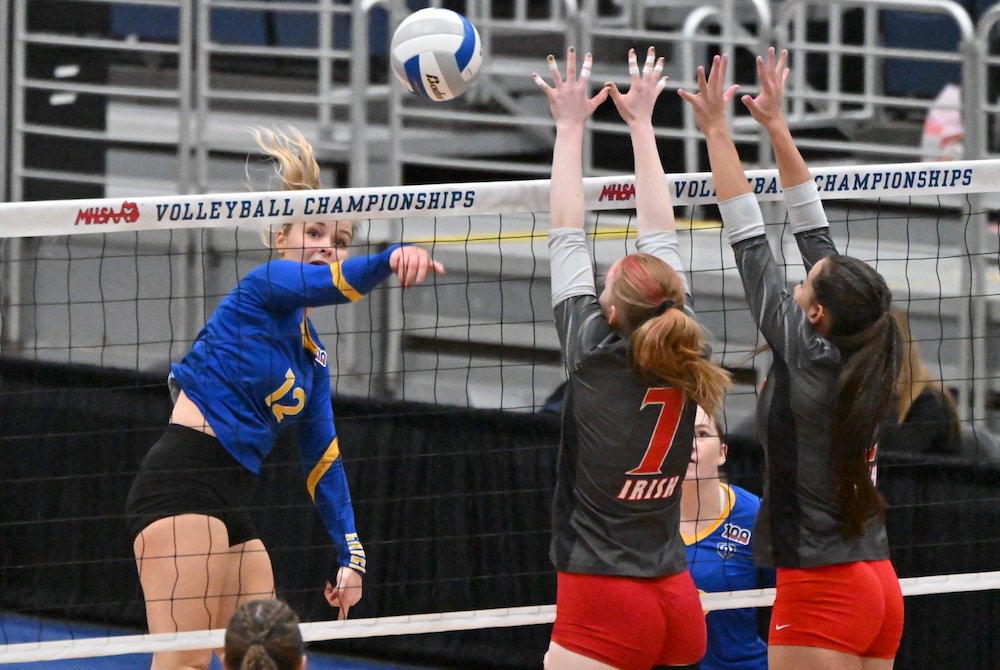
Story in Photos: 2024 Volleyball Division 1 & 4 Semifinals
By
Geoff Kimmerly
MHSAA.com senior editor
November 21, 2024
BATTLE CREEK – The matchups for this season’s Division 1 and 4 Volleyball Finals are set after Thursday’s Semifinals at Kellogg Arena, with the possibility of first-time champions in both divisions, a reigning champion playing to repeat in near-perfect fashion and a past champion pursuing its first title in more than a decade.
Saturday’s first two Finals will see the following face off at Kellogg Arena:
10 a.m. – Division 4 – Clarkston Everest Collegiate (37-0-1) vs. St. Joseph Our Lady of the Lake Catholic (33-3-1)
Noon – Division 1 – Northville (40-2) vs. Rockford (40-9)
Everest is the reigning champion in Division 4 and attempting to become the first Finals winner to also finish undefeated since 2015. The Mountaineers face Our Lady, which will play in its first championship match.
Northville is seeking its first Finals title as well, and finished runner-up in 2022. Rockford is seeking its second championship, to go with its Class A title won in 2011.
Division 2 and 3 Semifinals will be played Friday. Click here for more.
Hockey Weekly Action Photos captured the following from Thursday’s action.
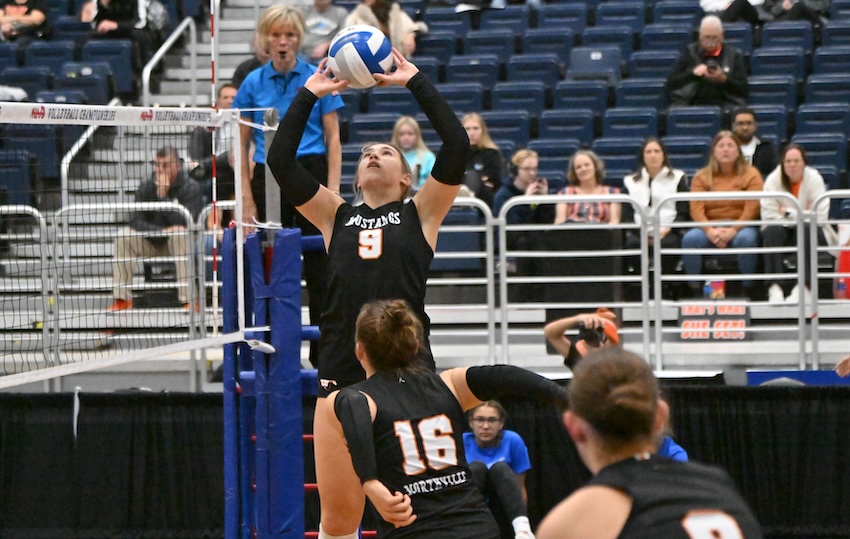
Northville’s Ella Craggs (9) sets for Elle Chenowith (16) during their team’s 25-20, 20-25, 25-19, 25-22 Division 1 Semifinal win over Bloomfield Hills Marian (45-8).
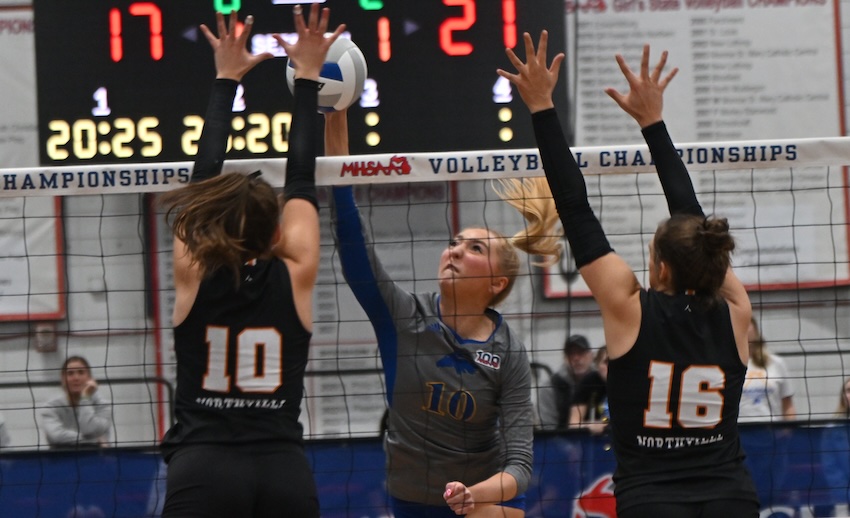
Marian’s Jayla Zayti works to get a ball past Northville’s Mallory Reck (10) and Chenowith (16). Zayti finished with six kills and seven blocks, while Reck had 18 kills and four blocks, and Chenowith had three blocks.
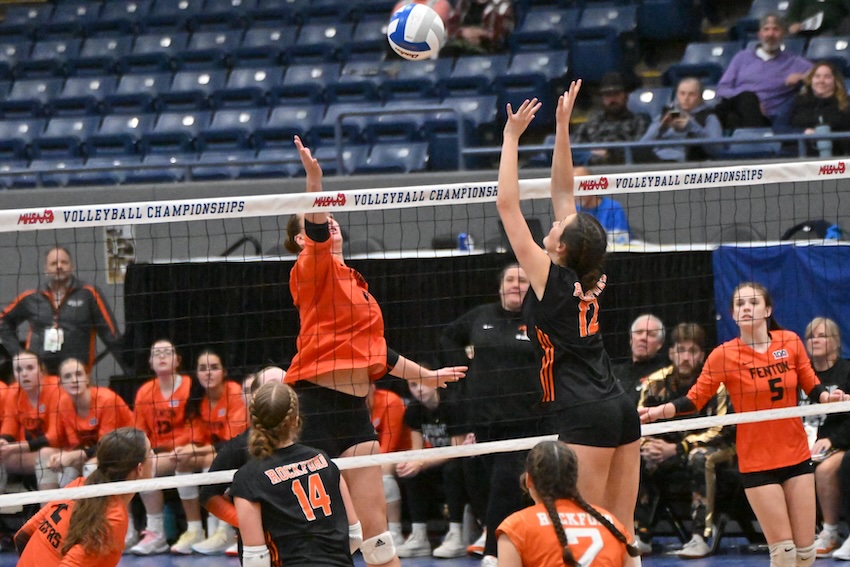
A Fenton player and Rockford's Grace Crelly (12) meet at the net of the second Division 1 Semifinal. Crelly finished with five kills in the Rams’ 25-12, 25-14, 25-8 victory.
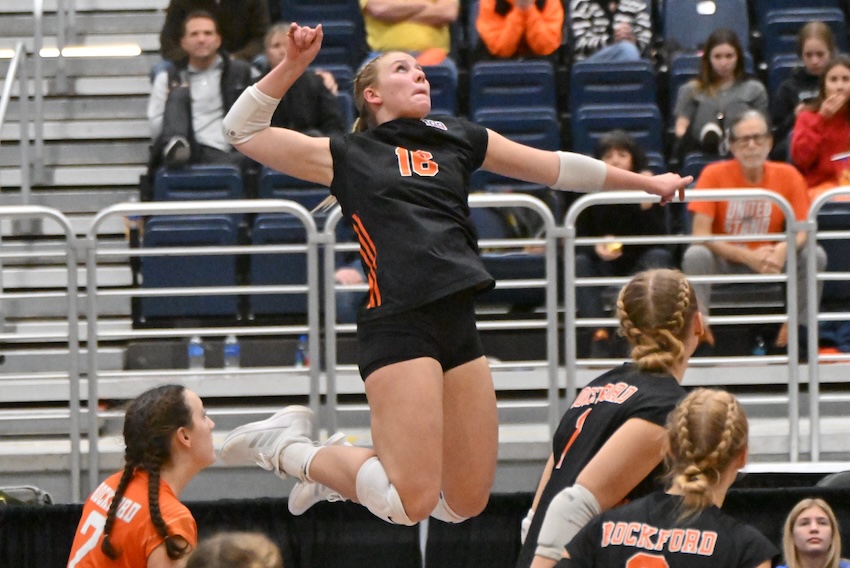
The Rams' Mallory Wandel (16) elevates for a kill attempt against the Tigers (36-5). Wandel finished with 18 kills.
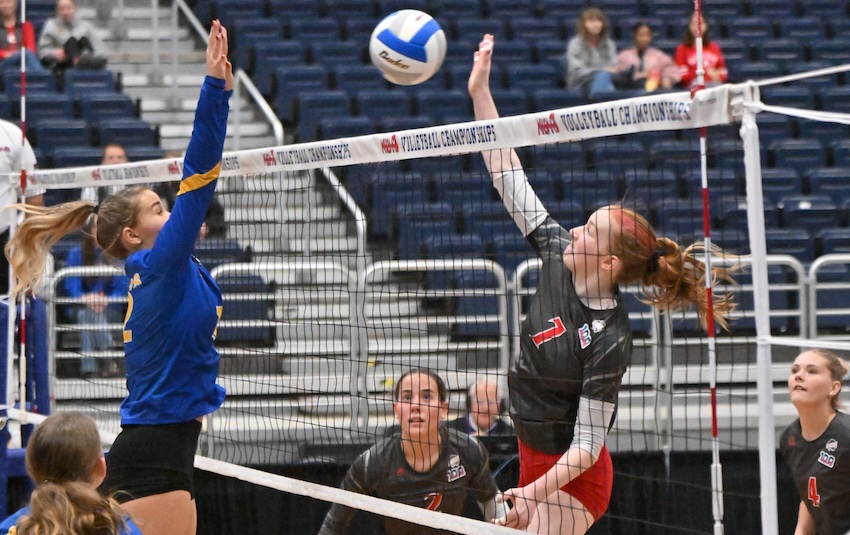
Mount Pleasant Sacred Heart’s Erin Judge (7) sends a kill attempt toward the Our Lady of the Lake side of the court. Judge finished with 13 kills, but the Lakers prevailed 24-26, 25-22, 26-11, 26-28, 15-8. The Irish finished 42-5-2 this fall.
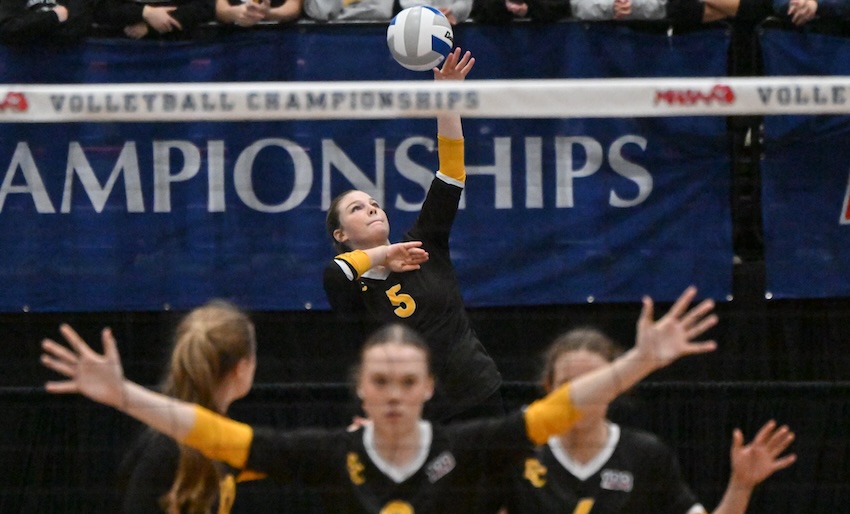
Clarkston Everest Collegiate’s Emmerson Phyle (5) serves during her team’s 25-10, 25-16, 25-13 sweep of Hancock to open the Division 4 Semifinals on Thursday. Phyle had a pair of aces during the match.
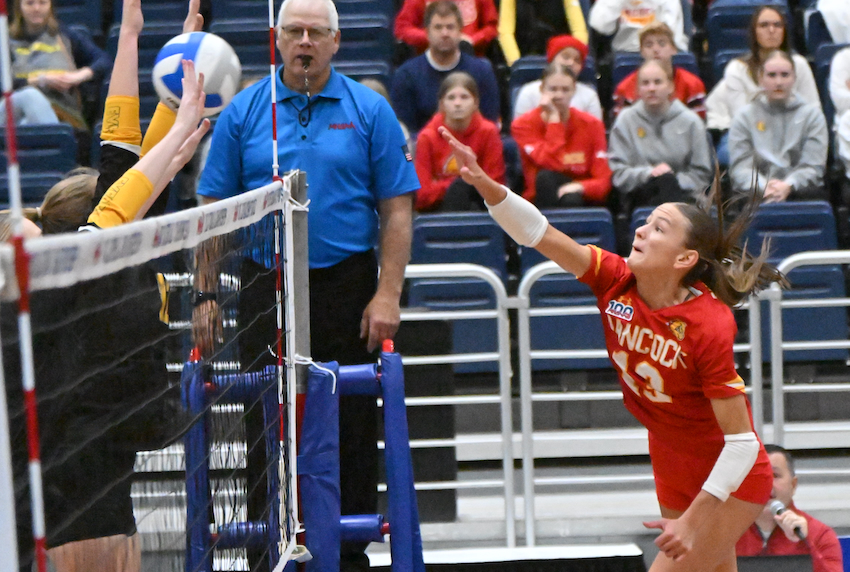
Hancock’s Brooke Koskela (13) puts a ball through an Everest block. Koskela finished with 10 kills for the Gremlins (25-7-2).
TOP PHOTO Our Lady of the Lake’s Nora Proos sends a spike into the block of Judge and another teammate Thursday.

